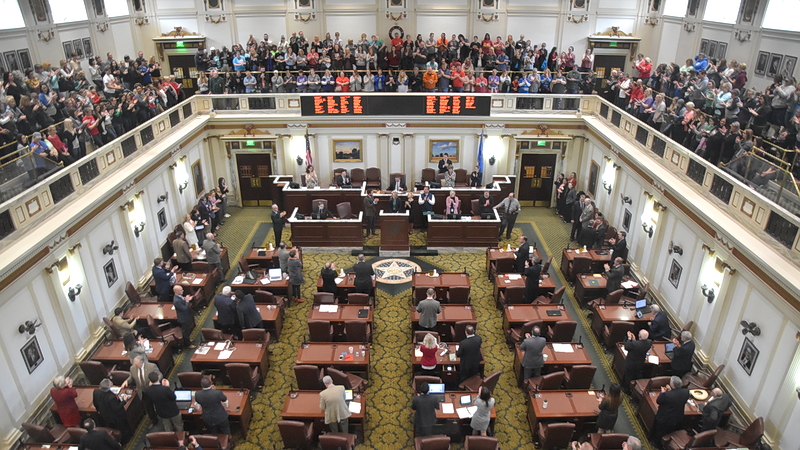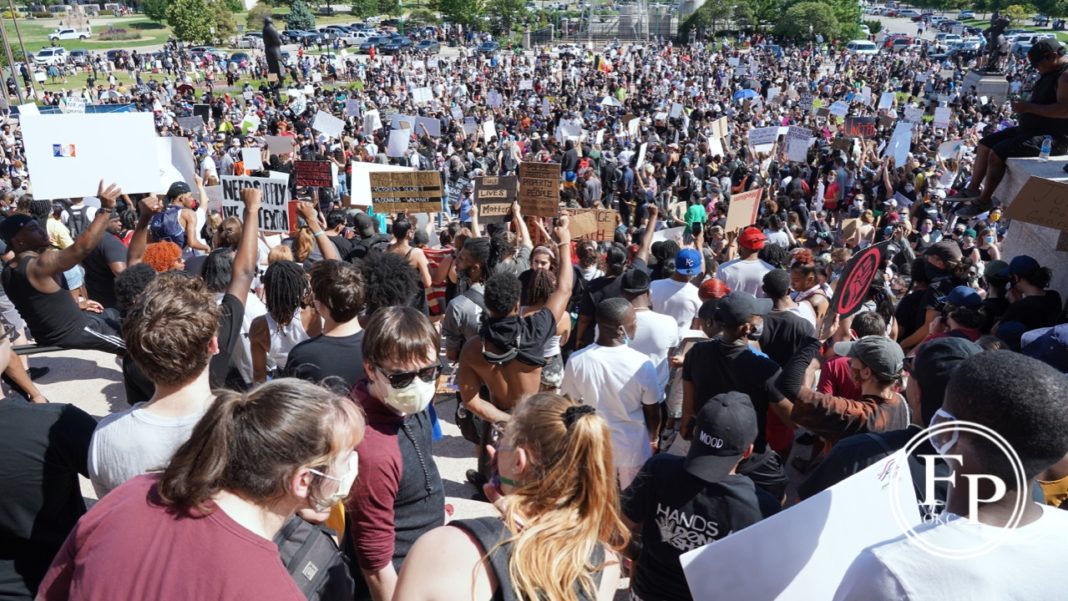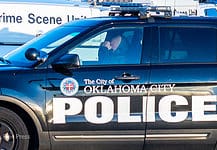Last Updated on April 3, 2021, 11:29 AM | Published: March 30, 2021
OKLAHOMA CITY (Free Press) — In response to the police brutality and racial justice protest that erupted across the country last summer, several bills aimed at restricting protesters’ rights are moving closer to becoming law in the Oklahoma House of Representatives and Senate.
The bills are among a variety of similar proposed measures introduced in state legislatures nationwide that are aimed at increasing penalties for protesters.
The bills range from extending protections for law enforcement officers to granting immunity for drivers who harm protesters while fleeing from a riot.
Nearly 50 people were arrested during several days of protests that broke out last summer in Oklahoma City and Tulsa.
House Bills
HB1643, authored by Rep. Kevin West and Sen. David Bullard, was presented as an “anti-doxxing” bill that would make it a misdemeanor to post personally identifiable information of a police officer or an elected official with the intent to threaten, intimidate, or harass.
According to the bill, personal information includes their home address; address of their partner or minor child; and any phone number or e-mail address of the officer or public official.
The measure states that any person who knowingly publishes personally identifiable information with the intent to threaten, intimidate or harass a police officer or public official shall, upon conviction, be charged with a misdemeanor with up to 6 months in jail or fined up to $1,000 with sentence enhancements.
HB 1643 has been sent to the Senate and assigned to the General Government committee where it passed with a vote of 6-2. The bill will now be sent back to the House as it advances in the legislative process.
HB 1674, another bill authored by West and co-authored by Sen. Rob Stanridge, would grant civil and criminal immunity for motorists who unintentionally injure or kill protesters while “fleeing from a riot” if they have a reasonable belief that doing so was necessary to protect themselves from serious harm.
The bill would also criminalize citizens who are considered to be unlawfully obstructing the normal use of any public street, highway, or road within the state by impeding, hindering, or blocking traffic. The bill would make it a misdemeanor punishable with jail time for up to one year or a fine of up to $5,000.
The bill was recently passed by the Senate Public Safety committee on a vote of 8-1.
HB 1822, authored by Rep. Mark McBride and Sen. Darrell Weaver, creates regulations for demonstrations on Capitol grounds.
The bill would prohibit many actions that have been demonstrated at nearly every recent protest at the Capitol. The restrictions vary, but one of the regulations would prohibit gatherings in a way that would obstruct sidewalks, walkways, or entryways to the building.
If passed, demonstrators who fail to comply with the measure could result in law enforcement to remove or arrest protesters.
The bill recently passed out of the General Government committee in the Senate with a vote of 6-2.
HB 2095, by Rep. Mark Lepak, would add participating in unlawful assemblies to the (RICO) Oklahoma Racketeer Influenced and Corrupt Organizations Act, which targets organized crime.
Under the bill, individuals engaged with planning, organizing, or attending a protest that has been deemed a riot may face penalties for racketeering activity.
The House passed the bill with a vote of 78-18. The legislation has since advanced to the Senate and was recently referred to the Senate Judiciary Committee, chaired by the bill’s co-author Sen. Julie Daniels.

Senate Bills
SB 6, similar to HB 1643, would also make it unlawful to post publicly identifiable information of a law enforcement officer or a member of their family with the intent to threaten, intimidate, harass, or the intent to cause emotional distress or financial loss.
Authored by Rep. John West and Sen. Paul Rosino, the bill also extends the definition of what is considered personally identifiable information. This includes name, birth date, address, phone number, driver’s license number, place of employment or a photograph or realistic likeness.
The Senate passed the measure on a vote of 39-8 and has recently been referred to the House Public Safety committee.
SB 119, authored by Rep. Todd Russ and Sen. Mark Allen, would create a permitting process for access to Capitol grounds, which would require a 14-day notice prior to a demonstration and liability insurance.
Under the bill, permit holders would assume all liability, and failure to acquire a permit could result in law enforcement removing people
The measure was recently passed by the General Government committee in the House with a vote of 6-2.
SB 806, by Rep. Rande Worthen and Sen. Darrell Weaver, or The Oklahoma Citizens’ Protection Act would extend protections for law enforcement from protestors who are deemed to be participating in a riot.
The proposal would also increase criminal penalties for assaulting a police officer during a riot, blocking traffic, threatening to disturb the peace, or being involved in a riot. The bill includes several different punishments for these actions, such as mandatory jail time and fines.
SB 806 recently passed out of the House Appropriations and Budget Public Safety subcommittee, with 5 in favor and 1 opposed to the legislation. The bill will now advance to the House full committee.
SB 560, similar to HB 1674, removes civil and criminal liability for drivers who injure or kill protestors for a “reasonable effort” to escape from unlawful gatherings that obstruct traffic.
The bill, by Rep. Rick West and co-authored by Sen. Nathan Dahm, was introduced as an effort to protect motorists who are approached or surrounded during a riot. Unlike HB 1674, the language in the Senate bill does not mention the driver’s intent, meaning the driver may intentionally or unintentionally hit protesters in their attempt to flee the situation.
If passed, the measure would justify the use of defensive force to grant immunity to drivers who use defensive force to escape the situation.
The legislation was recently referred to the Judiciary – Criminal committee in the House for a second reading.
Update: The Senate bill passed out of the House Judiciary – Criminal Committee on Wednesday afternoon, with a vote of 8-2. SB 560 will now advance to the full House to be before it’s sent to the governor to be signed into law.
If enacted, the measures would become effective in November 2021.
Brianna Garcia is a freelance journalist covering local politics and culture for Free Press. She has a degree in Journalism from the University of Central Oklahoma.











